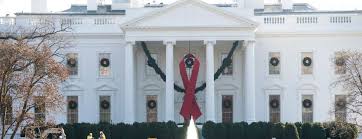Source: news.bloomberglaw.com
The White House’s initiative to end the spread of HIV/AIDS is at odds with the federal health department’s efforts to accommodate health workers’ religious beliefs, according to members of the HIV/AIDS panel.
Four members of a White House panel are urging the Trump administration to avoid taking actions that could hinder LGBT individuals’ ability to get care. The panel released a letter to the public that was spearheaded by the panel’s two co-chairs. It followed a meeting with and a letter from Health and Human Services Office for Civil Rights Director Roger Severino last fall.
The initiative to end the spread of HIV in the U.S. by 2030 and the religious conscience movement are both top priorities for President Donald Trump.
The tension between the two efforts “shows the pitfalls and dangers” of the divergent views in the administration, Carl Schmid, co-chair of the Presidential Advisory Commission on HIV/AIDS, said in an interview.
On one hand, the success of HIV initiative relies on getting certain communities—particularly black women and gay and bisexual men of color—access to care. On the other hand, the administration strongly holds that health providers with resolute religious beliefs should be respected.
Severino’s office has put forth two regulations that advocates say could harm care for LGBT patients and people with HIV. One regulation would allow health-care workers to deny care based on their religious and moral beliefs, and the other would undo Obama-era regulations under Section 1557 of the Affordable Care Act that protect LGBT individuals and women seeking abortions from discrimination in health-care settings.
Schmid said he hopes HHS Secretary Alex Azar will choose to drop the two proposed rules rather than finalizing them.
The HHS civil rights office sees protections of religious freedoms as essential to making sure health-care professionals don’t get penalized for the actions they do or don’t do in their jobs because of their moral beliefs.
Court Challenges
The regulation that addresses religious conscience protections is undergoing challenges in the courts. Three federal courts have struck down the rule, and the Trump administration has appealed the decision.
The administration has “proposed regulations that we feel hinder the progress in advancing” the HIV initiative, Schmid, founder of the HIV and Hepatitis Policy Institute, told Bloomberg Law.
The HIV/AIDS commission’s goal is to destigmatize HIV and build trust between patients, government entities, and the health system. That can’t happen when a separate government unit is “giving permission for people to discriminate and withhold care,” Schmid said.
For example, the religious conscience rule gives license to health providers to refuse to test for HIV or offer an HIV prevention drug, he said.
Members of the panel met with Severino Sept. 24 and expressed their concerns about civil rights protects for LGBT patients and people living with HIV, Severino disclosed in an October letter.
The civil rights office is “committed to supporting full implementation” of the HIV initiative, Severino said at the time. The HHS is “committed to the principle that discrimination has no place in our nation’s health care system.”
Severino’s office didn’t respond to a request for comment on the HIV panel’s most recent letter.
The civil rights office has gone after some providers for discriminatory behavior. In October, it required a Florida orthopedic practice to update its nondiscrimination policies for dismissing patients to resolve allegations it discriminated against a patient with HIV.
Even as members of the HIV/AIDS panel and the administration have disagreements over policies, Schmid said members plan to continue offering “constructive criticism when it’s warranted.”
“It’s important to be at the table,” he said.
